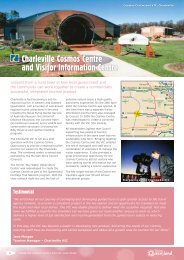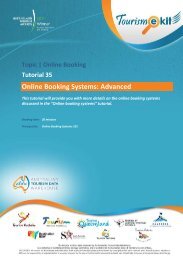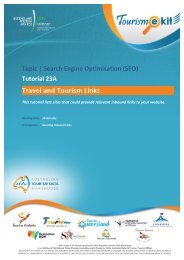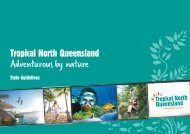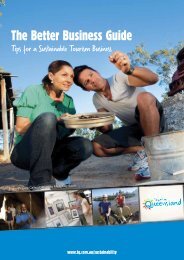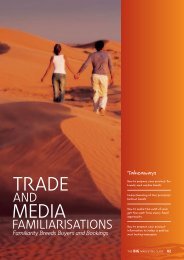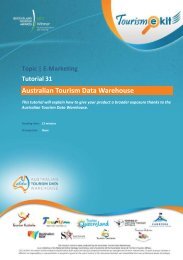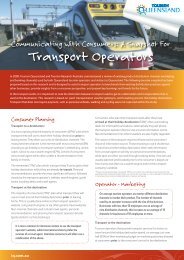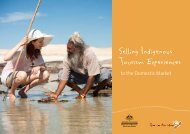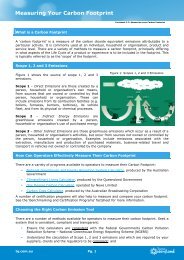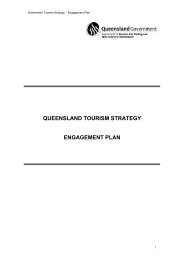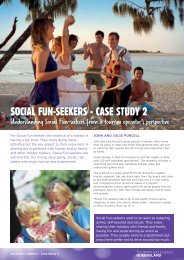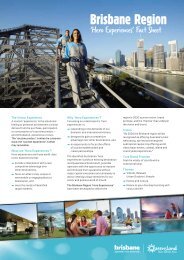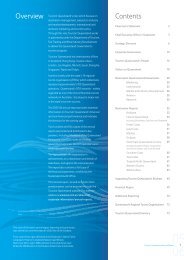Queensland Ecotourism Plan 2003-2008 - Tourism Queensland
Queensland Ecotourism Plan 2003-2008 - Tourism Queensland
Queensland Ecotourism Plan 2003-2008 - Tourism Queensland
Create successful ePaper yourself
Turn your PDF publications into a flip-book with our unique Google optimized e-Paper software.
Ecologically Sustainable Development (ESD) – Using, conserving and enhancing the<br />
community’s resources so that ecological processes, on which life depends, are maintained and<br />
the total quality of life, now and in the future, can be increased.<br />
Ecosystem – A dynamic complex of plant, animal, fungal and micro-organism communities,<br />
and the associated non-living environment interacting as an ecological unit.<br />
<strong>Ecotourism</strong> – Encompasses a spectrum of nature-based activities that foster visitor<br />
appreciation and understanding of natural and cultural heritage and are managed to be<br />
ecologically, economically and socially sustainable.<br />
Host community – Groups such as permanent residents, local businesses, and other interest<br />
groups in a destination who have a common interest in maintaining a high quality of life.<br />
Interpretation – Revealing the significance and meanings of natural and associated cultural<br />
phenomena to visitors, usually with the intent of providing a satisfying learning experience and<br />
encouraging more sustainable behaviour.<br />
Market segmentation – The division of a larger consumer market into smaller, homogeneous<br />
groups on the basis of geographical, socio-demographic, psychographic and/or behavioural<br />
characteristics, in order to better effect target marketing and management strategies.<br />
Native title – Recognition in Australian law of Indigenous Australians’ (including Aboriginal<br />
and Torres Strait Islander people) rights and interests in land and waters according to<br />
traditional laws and customs.<br />
Natural areas – Areas that exist in, or are formed by, nature; not artificial; incorporates<br />
cultural aspects.<br />
29<br />
Off-site management – Provision of pre-visit (or otherwise off-site) educational and<br />
interpretive materials to raise awareness of management issues and encourage minimum<br />
impact behaviour.<br />
On-site management – Management of visitor impacts and behaviour on-site through the use<br />
of signs, formed tracks or board walks, barriers and the physical presence of management staff.<br />
Protected area – A designated portion of land or water to which regulations and restrictions<br />
have been applied, thereby affording a given degree of protection against on-site activities that<br />
threaten the environmental integrity of the area.<br />
Protected Area Managers – An individual, corporation or agency (whether public or private)<br />
responsible for the planning, management and/or operation of protected areas.<br />
Renewable energy – Energy sources that are practically inexhaustible. Alternatives to nonrenewable<br />
fossil fuels (such as coal and oil). For example solar, hydro and wind energy.<br />
Setting – A term used to describe the character of a place which takes into account its<br />
physical, social and managerial features.<br />
Sustainable development – Development carried out in such a way as to meet the needs of<br />
the present without compromising the ability of future generations to meet their own needs.<br />
Sustainable tourism – <strong>Tourism</strong> that can be sustained over the long term because it results in<br />
a net benefit for the social, economic, natural and cultural environments of the area in which it<br />
takes place.<br />
Tourist – A traveller who stays at least 40km away from home for one or more nights.<br />
World Heritage Listing – To identify and protect sites of “outstanding universal value”.



